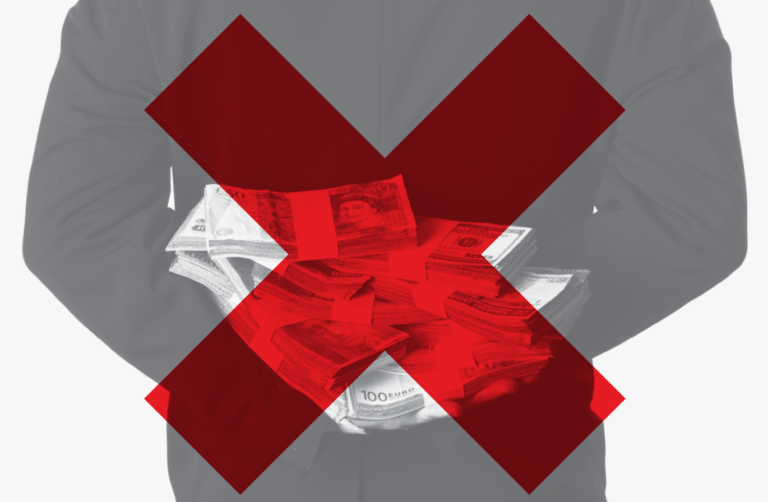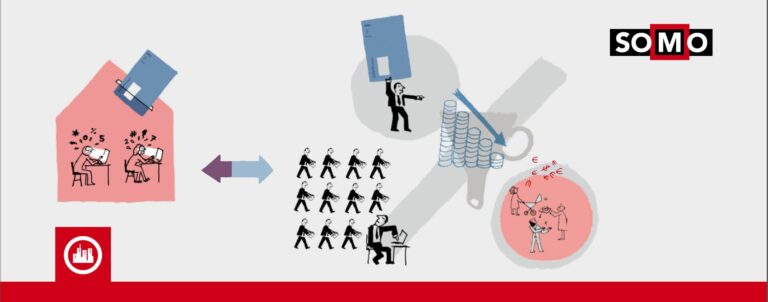
Tax games: the race to the bottom
Europe’s role in supporting an unjust global tax system
European governments are leading a race to the bottom which will see average global corporate tax rates hit zero by 2052, according to new findings out today. A detailed analysis of 17 EU member states and Norway reveals 12 governments have either just cut their corporate tax rate, or are planning to do so in the near future.
As big businesses are made to pay less corporate tax, consumers have to pay more in order to fill the gap. As today’s report points out, this disproportionately hits the poorest and risks exacerbating inequality rather than reducing it.
The report finds that:
- The global average tax rate is set to hit zero in 2052. Europe is playing a leading role in this race, and currently seem to be accelerating the pace. An analysis of developments in the EU and Norway shows that 12 governments have either just carried out a new cut in the corporate tax rate, or are planning to do so over the next few years;
- Harmful tax practices are popular in several European countries, and problematic practices such as patent boxes and secret advance tax rulings have been increasing in numbers over the last years. Out of the 18 countries analysed, five received a ‘green light’ on harmful tax practices, while nine countries (Belgium, Hungary, Ireland, Italy, Latvia, Luxembourg, the Netherlands, Spain and the UK) received a ‘red light’.
- European tax treaties with developing countries remain a key issue of concern. Out of the 18 countries analysed, 12 countries have tax treaty networks that are highly problematic;
- Six countries have pushed ahead in the fight against secret shell companies by introducing public company registers showing the real – beneficial – owners. These are: the UK, Denmark, Sweden, Finland, Slovenia and Latvia. Meanwhile, secret company ownership is still possible in 12 of the analysed countries, and the UK still offers opportunities for setting up anonymous trusts;
- The vast majority – ten of the analysed countries – seem reluctant or outright against the idea of introducing full public country by country reporting, which would allow citizens to see where multinational corporations do business, and how much they pay in taxes. Only Slovenia and Spain openly support full public country by country reporting;
- 13 out of 18 countries are openly against the proposal of establishing an intergovernmental UN tax body to address the problems in the global tax system, while ensuring that developing countries participate on a truly equal footing. Not a single European government has spoken out in favour;
- While the vast majority of the governments studied now provide financial support to promoting domestic resource mobilization in developing countries, few have analysed how their own tax systems and policies can either promote or undermine tax collection in developing countries
The chapter about The Netherlands was written by SOMO and Tax Justice Nederland(opens in new window) . SOMO and Tax Justice Nederland are both members of Eurodad(opens in new window) , a network of 46 civil society organisations (CSOs) from 19 European countries, which works for transformative yet specific changes to global and European policies, institutions, rules and structures to ensure a democratically controlled, environmentally sustainable financial and economic system that works to eradicate poverty and ensure human rights for all.
Do you need more information?
-

Jasper van Teeffelen
Researcher
Partners
Publication
Accompanying documents
Related content
-
 Europe leads the race towards a 0% corporate tax ratePosted in category:News
Europe leads the race towards a 0% corporate tax ratePosted in category:News Jasper van TeeffelenPublished on:
Jasper van TeeffelenPublished on: -
Survival of the Richest Published on:
 Jasper van TeeffelenPosted in category:Publication
Jasper van TeeffelenPosted in category:Publication Jasper van Teeffelen
Jasper van Teeffelen
-
Giving with one hand and taking with the other Published on:
 Roos van OsPosted in category:Publication
Roos van OsPosted in category:Publication Roos van Os
Roos van Os -

-

-
 A year after Luxleaks, most EU countries still fail to tackle tax dodgingPosted in category:NewsPublished on:
A year after Luxleaks, most EU countries still fail to tackle tax dodgingPosted in category:NewsPublished on: -
 ActionAid and SOMO reveal billion dollar tax break benefiting Shell, Total and EniPosted in category:NewsPublished on:
ActionAid and SOMO reveal billion dollar tax break benefiting Shell, Total and EniPosted in category:NewsPublished on: -
Fifty shades of tax dodging Published on:
 Indra RömgensPosted in category:Publication
Indra RömgensPosted in category:Publication Indra Römgens
Indra Römgens

